Emotional Intelligence: Factors, Leadership, Inculcation, and Analysis
VerifiedAdded on 2022/11/28
|13
|3458
|306
Report
AI Summary
This report delves into the concept of emotional intelligence, examining its definition and significance in contemporary business environments. It explores the key factors influencing emotional intelligence, including self-awareness, self-regulation, motivation, empathy, and social skills, and analyzes their interrelation. The report emphasizes the crucial role of emotional intelligence in effective leadership, highlighting how leaders can leverage these factors to understand and motivate their teams. It also discusses whether emotional intelligence is innate or can be developed through training and practice, suggesting various methods for its inculcation, such as workshops and vocational courses. Finally, the report offers insights into analyzing an individual's emotional intelligence, summarizing the key aspects of emotional intelligence and its impact on leadership effectiveness.
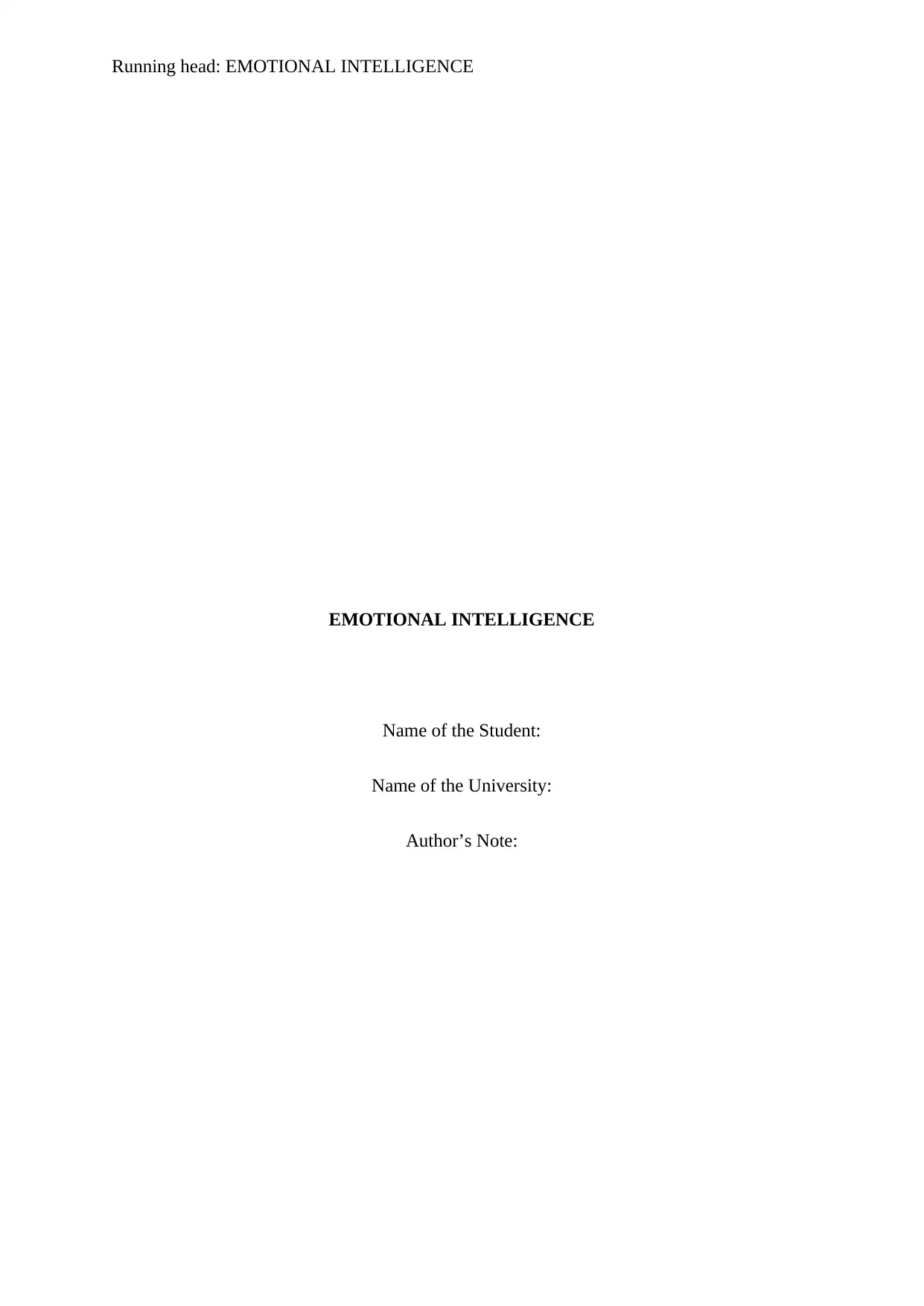
Running head: EMOTIONAL INTELLIGENCE
EMOTIONAL INTELLIGENCE
Name of the Student:
Name of the University:
Author’s Note:
EMOTIONAL INTELLIGENCE
Name of the Student:
Name of the University:
Author’s Note:
Paraphrase This Document
Need a fresh take? Get an instant paraphrase of this document with our AI Paraphraser
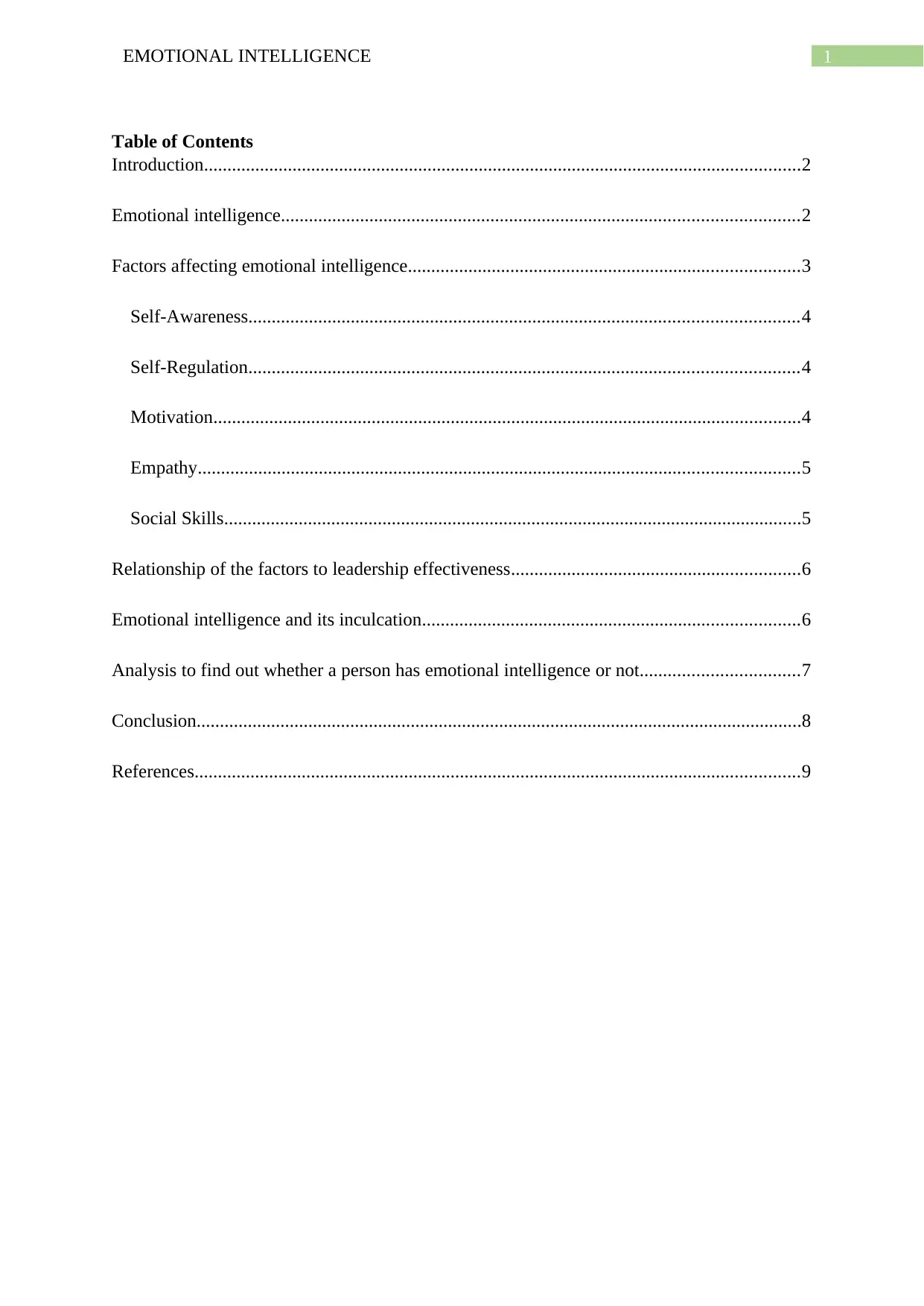
1EMOTIONAL INTELLIGENCE
Table of Contents
Introduction................................................................................................................................2
Emotional intelligence...............................................................................................................2
Factors affecting emotional intelligence....................................................................................3
Self-Awareness......................................................................................................................4
Self-Regulation......................................................................................................................4
Motivation..............................................................................................................................4
Empathy.................................................................................................................................5
Social Skills............................................................................................................................5
Relationship of the factors to leadership effectiveness..............................................................6
Emotional intelligence and its inculcation.................................................................................6
Analysis to find out whether a person has emotional intelligence or not..................................7
Conclusion..................................................................................................................................8
References..................................................................................................................................9
Table of Contents
Introduction................................................................................................................................2
Emotional intelligence...............................................................................................................2
Factors affecting emotional intelligence....................................................................................3
Self-Awareness......................................................................................................................4
Self-Regulation......................................................................................................................4
Motivation..............................................................................................................................4
Empathy.................................................................................................................................5
Social Skills............................................................................................................................5
Relationship of the factors to leadership effectiveness..............................................................6
Emotional intelligence and its inculcation.................................................................................6
Analysis to find out whether a person has emotional intelligence or not..................................7
Conclusion..................................................................................................................................8
References..................................................................................................................................9
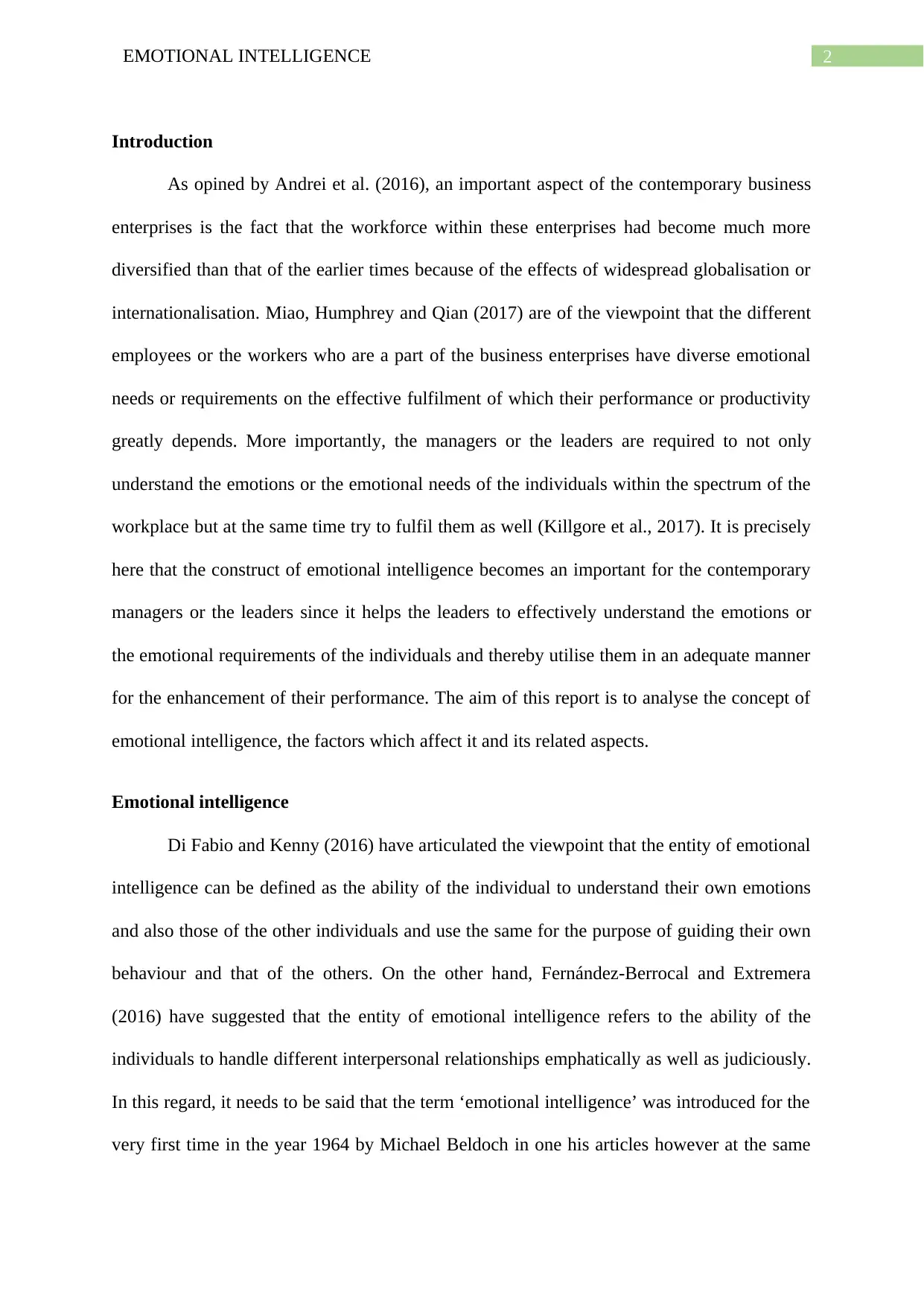
2EMOTIONAL INTELLIGENCE
Introduction
As opined by Andrei et al. (2016), an important aspect of the contemporary business
enterprises is the fact that the workforce within these enterprises had become much more
diversified than that of the earlier times because of the effects of widespread globalisation or
internationalisation. Miao, Humphrey and Qian (2017) are of the viewpoint that the different
employees or the workers who are a part of the business enterprises have diverse emotional
needs or requirements on the effective fulfilment of which their performance or productivity
greatly depends. More importantly, the managers or the leaders are required to not only
understand the emotions or the emotional needs of the individuals within the spectrum of the
workplace but at the same time try to fulfil them as well (Killgore et al., 2017). It is precisely
here that the construct of emotional intelligence becomes an important for the contemporary
managers or the leaders since it helps the leaders to effectively understand the emotions or
the emotional requirements of the individuals and thereby utilise them in an adequate manner
for the enhancement of their performance. The aim of this report is to analyse the concept of
emotional intelligence, the factors which affect it and its related aspects.
Emotional intelligence
Di Fabio and Kenny (2016) have articulated the viewpoint that the entity of emotional
intelligence can be defined as the ability of the individual to understand their own emotions
and also those of the other individuals and use the same for the purpose of guiding their own
behaviour and that of the others. On the other hand, Fernández-Berrocal and Extremera
(2016) have suggested that the entity of emotional intelligence refers to the ability of the
individuals to handle different interpersonal relationships emphatically as well as judiciously.
In this regard, it needs to be said that the term ‘emotional intelligence’ was introduced for the
very first time in the year 1964 by Michael Beldoch in one his articles however at the same
Introduction
As opined by Andrei et al. (2016), an important aspect of the contemporary business
enterprises is the fact that the workforce within these enterprises had become much more
diversified than that of the earlier times because of the effects of widespread globalisation or
internationalisation. Miao, Humphrey and Qian (2017) are of the viewpoint that the different
employees or the workers who are a part of the business enterprises have diverse emotional
needs or requirements on the effective fulfilment of which their performance or productivity
greatly depends. More importantly, the managers or the leaders are required to not only
understand the emotions or the emotional needs of the individuals within the spectrum of the
workplace but at the same time try to fulfil them as well (Killgore et al., 2017). It is precisely
here that the construct of emotional intelligence becomes an important for the contemporary
managers or the leaders since it helps the leaders to effectively understand the emotions or
the emotional requirements of the individuals and thereby utilise them in an adequate manner
for the enhancement of their performance. The aim of this report is to analyse the concept of
emotional intelligence, the factors which affect it and its related aspects.
Emotional intelligence
Di Fabio and Kenny (2016) have articulated the viewpoint that the entity of emotional
intelligence can be defined as the ability of the individual to understand their own emotions
and also those of the other individuals and use the same for the purpose of guiding their own
behaviour and that of the others. On the other hand, Fernández-Berrocal and Extremera
(2016) have suggested that the entity of emotional intelligence refers to the ability of the
individuals to handle different interpersonal relationships emphatically as well as judiciously.
In this regard, it needs to be said that the term ‘emotional intelligence’ was introduced for the
very first time in the year 1964 by Michael Beldoch in one his articles however at the same
⊘ This is a preview!⊘
Do you want full access?
Subscribe today to unlock all pages.

Trusted by 1+ million students worldwide
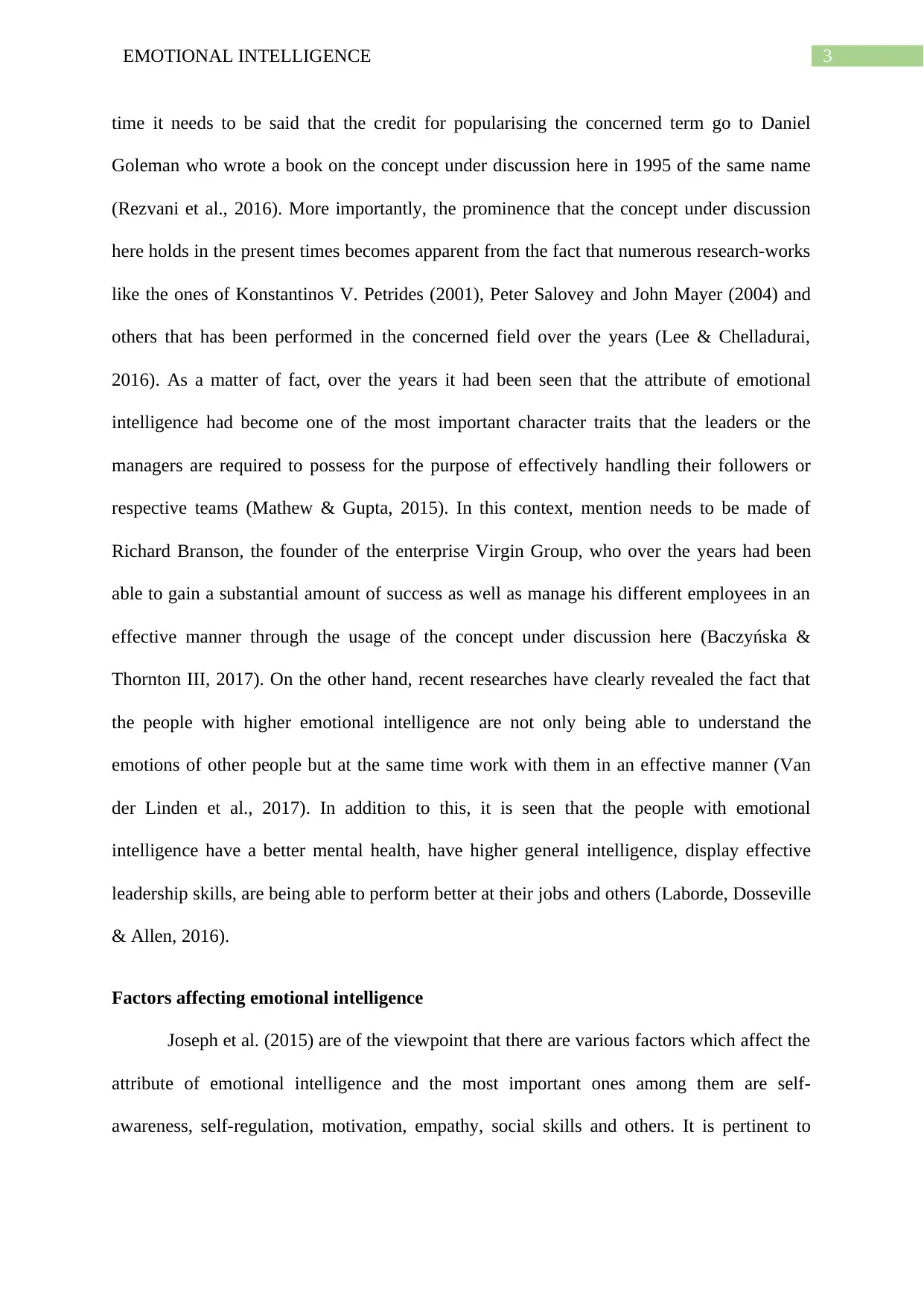
3EMOTIONAL INTELLIGENCE
time it needs to be said that the credit for popularising the concerned term go to Daniel
Goleman who wrote a book on the concept under discussion here in 1995 of the same name
(Rezvani et al., 2016). More importantly, the prominence that the concept under discussion
here holds in the present times becomes apparent from the fact that numerous research-works
like the ones of Konstantinos V. Petrides (2001), Peter Salovey and John Mayer (2004) and
others that has been performed in the concerned field over the years (Lee & Chelladurai,
2016). As a matter of fact, over the years it had been seen that the attribute of emotional
intelligence had become one of the most important character traits that the leaders or the
managers are required to possess for the purpose of effectively handling their followers or
respective teams (Mathew & Gupta, 2015). In this context, mention needs to be made of
Richard Branson, the founder of the enterprise Virgin Group, who over the years had been
able to gain a substantial amount of success as well as manage his different employees in an
effective manner through the usage of the concept under discussion here (Baczyńska &
Thornton III, 2017). On the other hand, recent researches have clearly revealed the fact that
the people with higher emotional intelligence are not only being able to understand the
emotions of other people but at the same time work with them in an effective manner (Van
der Linden et al., 2017). In addition to this, it is seen that the people with emotional
intelligence have a better mental health, have higher general intelligence, display effective
leadership skills, are being able to perform better at their jobs and others (Laborde, Dosseville
& Allen, 2016).
Factors affecting emotional intelligence
Joseph et al. (2015) are of the viewpoint that there are various factors which affect the
attribute of emotional intelligence and the most important ones among them are self-
awareness, self-regulation, motivation, empathy, social skills and others. It is pertinent to
time it needs to be said that the credit for popularising the concerned term go to Daniel
Goleman who wrote a book on the concept under discussion here in 1995 of the same name
(Rezvani et al., 2016). More importantly, the prominence that the concept under discussion
here holds in the present times becomes apparent from the fact that numerous research-works
like the ones of Konstantinos V. Petrides (2001), Peter Salovey and John Mayer (2004) and
others that has been performed in the concerned field over the years (Lee & Chelladurai,
2016). As a matter of fact, over the years it had been seen that the attribute of emotional
intelligence had become one of the most important character traits that the leaders or the
managers are required to possess for the purpose of effectively handling their followers or
respective teams (Mathew & Gupta, 2015). In this context, mention needs to be made of
Richard Branson, the founder of the enterprise Virgin Group, who over the years had been
able to gain a substantial amount of success as well as manage his different employees in an
effective manner through the usage of the concept under discussion here (Baczyńska &
Thornton III, 2017). On the other hand, recent researches have clearly revealed the fact that
the people with higher emotional intelligence are not only being able to understand the
emotions of other people but at the same time work with them in an effective manner (Van
der Linden et al., 2017). In addition to this, it is seen that the people with emotional
intelligence have a better mental health, have higher general intelligence, display effective
leadership skills, are being able to perform better at their jobs and others (Laborde, Dosseville
& Allen, 2016).
Factors affecting emotional intelligence
Joseph et al. (2015) are of the viewpoint that there are various factors which affect the
attribute of emotional intelligence and the most important ones among them are self-
awareness, self-regulation, motivation, empathy, social skills and others. It is pertinent to
Paraphrase This Document
Need a fresh take? Get an instant paraphrase of this document with our AI Paraphraser
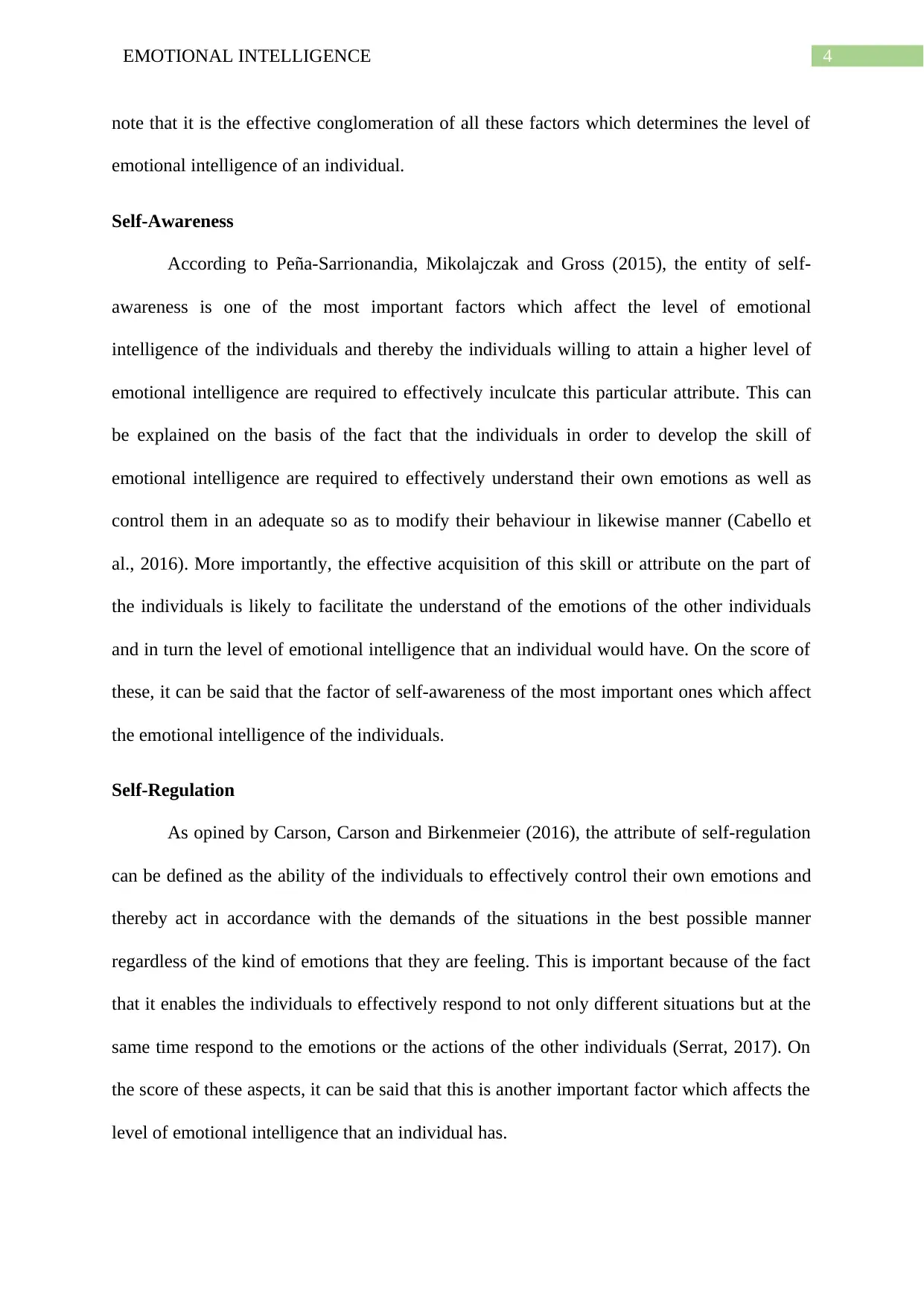
4EMOTIONAL INTELLIGENCE
note that it is the effective conglomeration of all these factors which determines the level of
emotional intelligence of an individual.
Self-Awareness
According to Peña-Sarrionandia, Mikolajczak and Gross (2015), the entity of self-
awareness is one of the most important factors which affect the level of emotional
intelligence of the individuals and thereby the individuals willing to attain a higher level of
emotional intelligence are required to effectively inculcate this particular attribute. This can
be explained on the basis of the fact that the individuals in order to develop the skill of
emotional intelligence are required to effectively understand their own emotions as well as
control them in an adequate so as to modify their behaviour in likewise manner (Cabello et
al., 2016). More importantly, the effective acquisition of this skill or attribute on the part of
the individuals is likely to facilitate the understand of the emotions of the other individuals
and in turn the level of emotional intelligence that an individual would have. On the score of
these, it can be said that the factor of self-awareness of the most important ones which affect
the emotional intelligence of the individuals.
Self-Regulation
As opined by Carson, Carson and Birkenmeier (2016), the attribute of self-regulation
can be defined as the ability of the individuals to effectively control their own emotions and
thereby act in accordance with the demands of the situations in the best possible manner
regardless of the kind of emotions that they are feeling. This is important because of the fact
that it enables the individuals to effectively respond to not only different situations but at the
same time respond to the emotions or the actions of the other individuals (Serrat, 2017). On
the score of these aspects, it can be said that this is another important factor which affects the
level of emotional intelligence that an individual has.
note that it is the effective conglomeration of all these factors which determines the level of
emotional intelligence of an individual.
Self-Awareness
According to Peña-Sarrionandia, Mikolajczak and Gross (2015), the entity of self-
awareness is one of the most important factors which affect the level of emotional
intelligence of the individuals and thereby the individuals willing to attain a higher level of
emotional intelligence are required to effectively inculcate this particular attribute. This can
be explained on the basis of the fact that the individuals in order to develop the skill of
emotional intelligence are required to effectively understand their own emotions as well as
control them in an adequate so as to modify their behaviour in likewise manner (Cabello et
al., 2016). More importantly, the effective acquisition of this skill or attribute on the part of
the individuals is likely to facilitate the understand of the emotions of the other individuals
and in turn the level of emotional intelligence that an individual would have. On the score of
these, it can be said that the factor of self-awareness of the most important ones which affect
the emotional intelligence of the individuals.
Self-Regulation
As opined by Carson, Carson and Birkenmeier (2016), the attribute of self-regulation
can be defined as the ability of the individuals to effectively control their own emotions and
thereby act in accordance with the demands of the situations in the best possible manner
regardless of the kind of emotions that they are feeling. This is important because of the fact
that it enables the individuals to effectively respond to not only different situations but at the
same time respond to the emotions or the actions of the other individuals (Serrat, 2017). On
the score of these aspects, it can be said that this is another important factor which affects the
level of emotional intelligence that an individual has.
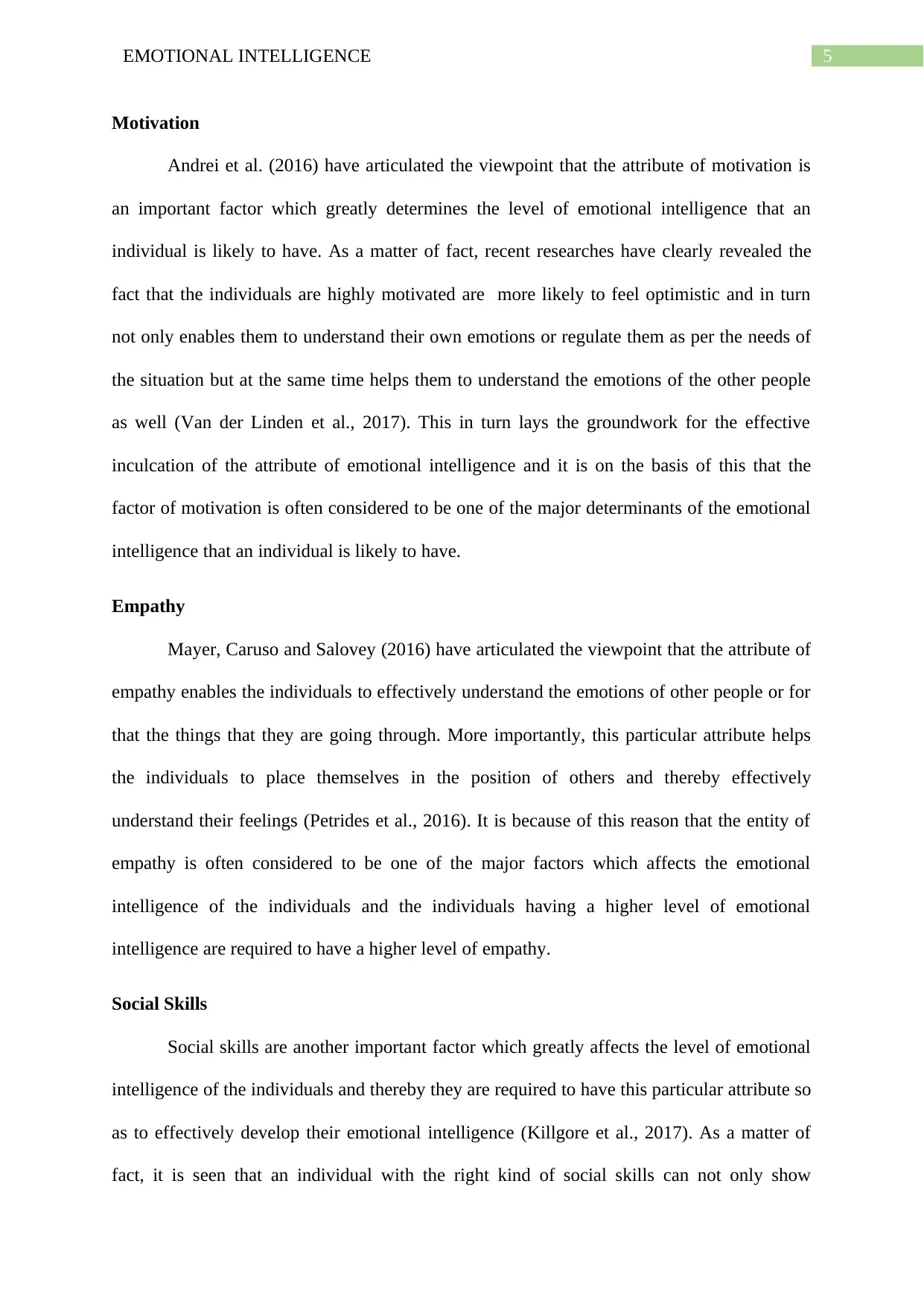
5EMOTIONAL INTELLIGENCE
Motivation
Andrei et al. (2016) have articulated the viewpoint that the attribute of motivation is
an important factor which greatly determines the level of emotional intelligence that an
individual is likely to have. As a matter of fact, recent researches have clearly revealed the
fact that the individuals are highly motivated are more likely to feel optimistic and in turn
not only enables them to understand their own emotions or regulate them as per the needs of
the situation but at the same time helps them to understand the emotions of the other people
as well (Van der Linden et al., 2017). This in turn lays the groundwork for the effective
inculcation of the attribute of emotional intelligence and it is on the basis of this that the
factor of motivation is often considered to be one of the major determinants of the emotional
intelligence that an individual is likely to have.
Empathy
Mayer, Caruso and Salovey (2016) have articulated the viewpoint that the attribute of
empathy enables the individuals to effectively understand the emotions of other people or for
that the things that they are going through. More importantly, this particular attribute helps
the individuals to place themselves in the position of others and thereby effectively
understand their feelings (Petrides et al., 2016). It is because of this reason that the entity of
empathy is often considered to be one of the major factors which affects the emotional
intelligence of the individuals and the individuals having a higher level of emotional
intelligence are required to have a higher level of empathy.
Social Skills
Social skills are another important factor which greatly affects the level of emotional
intelligence of the individuals and thereby they are required to have this particular attribute so
as to effectively develop their emotional intelligence (Killgore et al., 2017). As a matter of
fact, it is seen that an individual with the right kind of social skills can not only show
Motivation
Andrei et al. (2016) have articulated the viewpoint that the attribute of motivation is
an important factor which greatly determines the level of emotional intelligence that an
individual is likely to have. As a matter of fact, recent researches have clearly revealed the
fact that the individuals are highly motivated are more likely to feel optimistic and in turn
not only enables them to understand their own emotions or regulate them as per the needs of
the situation but at the same time helps them to understand the emotions of the other people
as well (Van der Linden et al., 2017). This in turn lays the groundwork for the effective
inculcation of the attribute of emotional intelligence and it is on the basis of this that the
factor of motivation is often considered to be one of the major determinants of the emotional
intelligence that an individual is likely to have.
Empathy
Mayer, Caruso and Salovey (2016) have articulated the viewpoint that the attribute of
empathy enables the individuals to effectively understand the emotions of other people or for
that the things that they are going through. More importantly, this particular attribute helps
the individuals to place themselves in the position of others and thereby effectively
understand their feelings (Petrides et al., 2016). It is because of this reason that the entity of
empathy is often considered to be one of the major factors which affects the emotional
intelligence of the individuals and the individuals having a higher level of emotional
intelligence are required to have a higher level of empathy.
Social Skills
Social skills are another important factor which greatly affects the level of emotional
intelligence of the individuals and thereby they are required to have this particular attribute so
as to effectively develop their emotional intelligence (Killgore et al., 2017). As a matter of
fact, it is seen that an individual with the right kind of social skills can not only show
⊘ This is a preview!⊘
Do you want full access?
Subscribe today to unlock all pages.

Trusted by 1+ million students worldwide
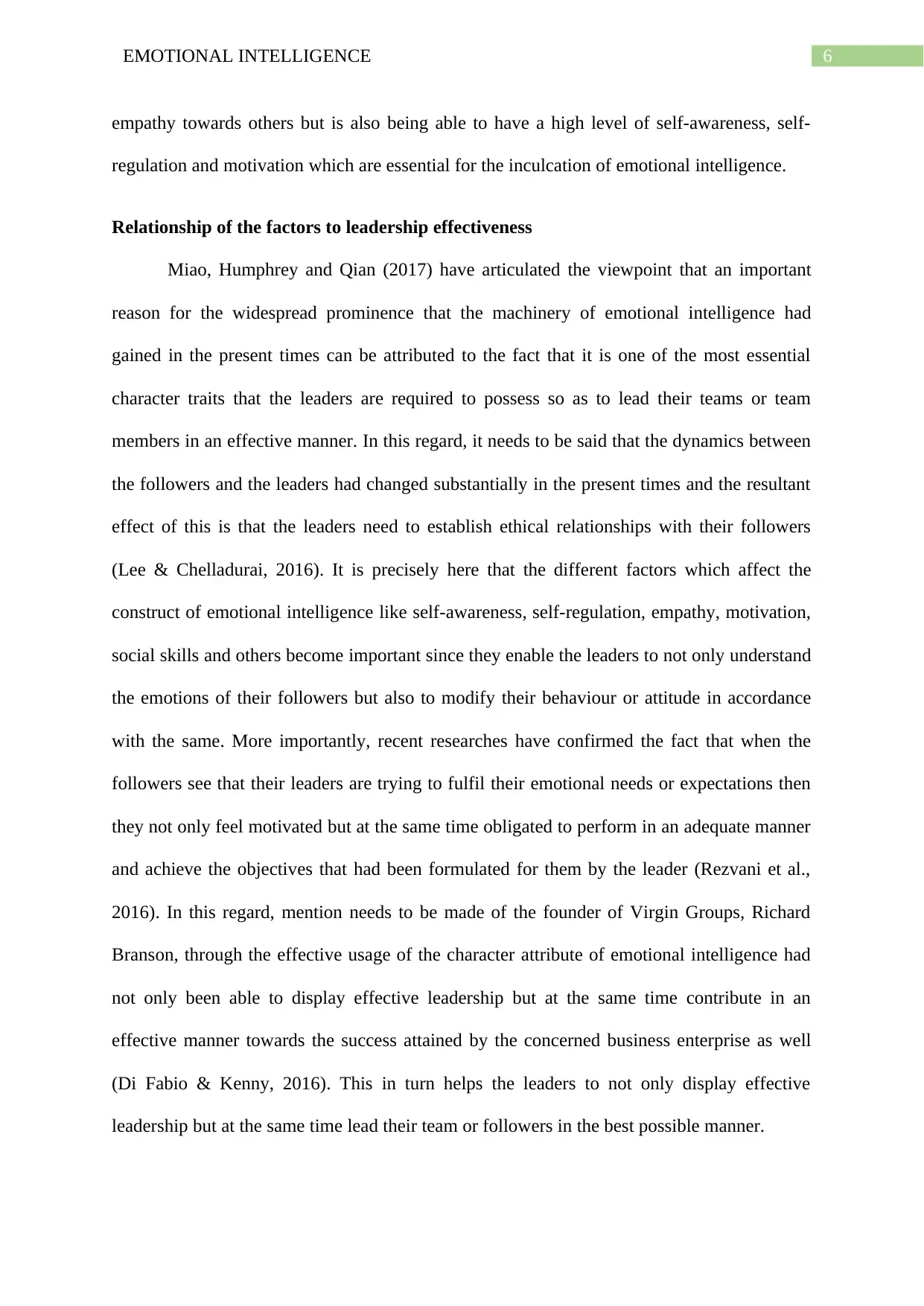
6EMOTIONAL INTELLIGENCE
empathy towards others but is also being able to have a high level of self-awareness, self-
regulation and motivation which are essential for the inculcation of emotional intelligence.
Relationship of the factors to leadership effectiveness
Miao, Humphrey and Qian (2017) have articulated the viewpoint that an important
reason for the widespread prominence that the machinery of emotional intelligence had
gained in the present times can be attributed to the fact that it is one of the most essential
character traits that the leaders are required to possess so as to lead their teams or team
members in an effective manner. In this regard, it needs to be said that the dynamics between
the followers and the leaders had changed substantially in the present times and the resultant
effect of this is that the leaders need to establish ethical relationships with their followers
(Lee & Chelladurai, 2016). It is precisely here that the different factors which affect the
construct of emotional intelligence like self-awareness, self-regulation, empathy, motivation,
social skills and others become important since they enable the leaders to not only understand
the emotions of their followers but also to modify their behaviour or attitude in accordance
with the same. More importantly, recent researches have confirmed the fact that when the
followers see that their leaders are trying to fulfil their emotional needs or expectations then
they not only feel motivated but at the same time obligated to perform in an adequate manner
and achieve the objectives that had been formulated for them by the leader (Rezvani et al.,
2016). In this regard, mention needs to be made of the founder of Virgin Groups, Richard
Branson, through the effective usage of the character attribute of emotional intelligence had
not only been able to display effective leadership but at the same time contribute in an
effective manner towards the success attained by the concerned business enterprise as well
(Di Fabio & Kenny, 2016). This in turn helps the leaders to not only display effective
leadership but at the same time lead their team or followers in the best possible manner.
empathy towards others but is also being able to have a high level of self-awareness, self-
regulation and motivation which are essential for the inculcation of emotional intelligence.
Relationship of the factors to leadership effectiveness
Miao, Humphrey and Qian (2017) have articulated the viewpoint that an important
reason for the widespread prominence that the machinery of emotional intelligence had
gained in the present times can be attributed to the fact that it is one of the most essential
character traits that the leaders are required to possess so as to lead their teams or team
members in an effective manner. In this regard, it needs to be said that the dynamics between
the followers and the leaders had changed substantially in the present times and the resultant
effect of this is that the leaders need to establish ethical relationships with their followers
(Lee & Chelladurai, 2016). It is precisely here that the different factors which affect the
construct of emotional intelligence like self-awareness, self-regulation, empathy, motivation,
social skills and others become important since they enable the leaders to not only understand
the emotions of their followers but also to modify their behaviour or attitude in accordance
with the same. More importantly, recent researches have confirmed the fact that when the
followers see that their leaders are trying to fulfil their emotional needs or expectations then
they not only feel motivated but at the same time obligated to perform in an adequate manner
and achieve the objectives that had been formulated for them by the leader (Rezvani et al.,
2016). In this regard, mention needs to be made of the founder of Virgin Groups, Richard
Branson, through the effective usage of the character attribute of emotional intelligence had
not only been able to display effective leadership but at the same time contribute in an
effective manner towards the success attained by the concerned business enterprise as well
(Di Fabio & Kenny, 2016). This in turn helps the leaders to not only display effective
leadership but at the same time lead their team or followers in the best possible manner.
Paraphrase This Document
Need a fresh take? Get an instant paraphrase of this document with our AI Paraphraser
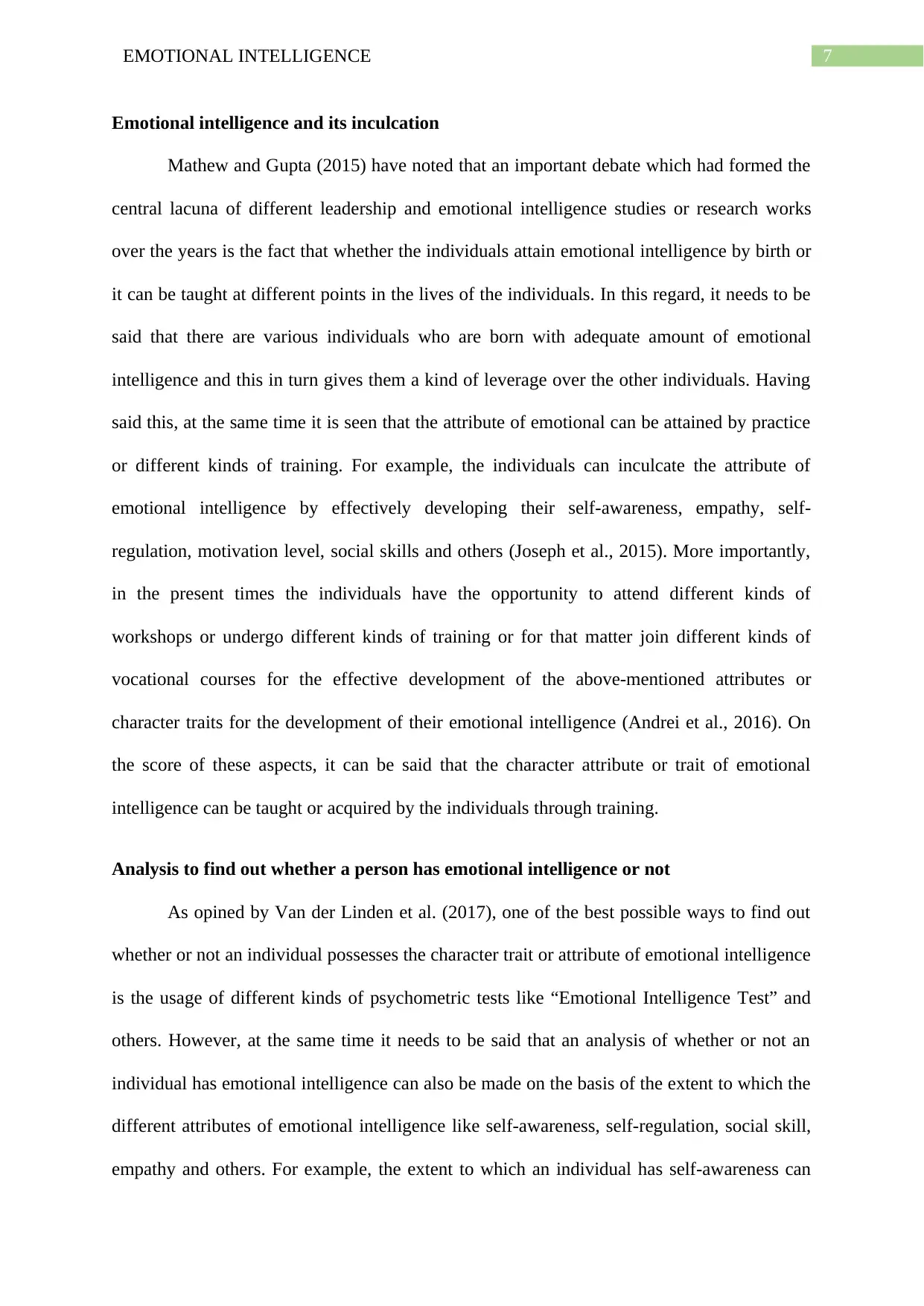
7EMOTIONAL INTELLIGENCE
Emotional intelligence and its inculcation
Mathew and Gupta (2015) have noted that an important debate which had formed the
central lacuna of different leadership and emotional intelligence studies or research works
over the years is the fact that whether the individuals attain emotional intelligence by birth or
it can be taught at different points in the lives of the individuals. In this regard, it needs to be
said that there are various individuals who are born with adequate amount of emotional
intelligence and this in turn gives them a kind of leverage over the other individuals. Having
said this, at the same time it is seen that the attribute of emotional can be attained by practice
or different kinds of training. For example, the individuals can inculcate the attribute of
emotional intelligence by effectively developing their self-awareness, empathy, self-
regulation, motivation level, social skills and others (Joseph et al., 2015). More importantly,
in the present times the individuals have the opportunity to attend different kinds of
workshops or undergo different kinds of training or for that matter join different kinds of
vocational courses for the effective development of the above-mentioned attributes or
character traits for the development of their emotional intelligence (Andrei et al., 2016). On
the score of these aspects, it can be said that the character attribute or trait of emotional
intelligence can be taught or acquired by the individuals through training.
Analysis to find out whether a person has emotional intelligence or not
As opined by Van der Linden et al. (2017), one of the best possible ways to find out
whether or not an individual possesses the character trait or attribute of emotional intelligence
is the usage of different kinds of psychometric tests like “Emotional Intelligence Test” and
others. However, at the same time it needs to be said that an analysis of whether or not an
individual has emotional intelligence can also be made on the basis of the extent to which the
different attributes of emotional intelligence like self-awareness, self-regulation, social skill,
empathy and others. For example, the extent to which an individual has self-awareness can
Emotional intelligence and its inculcation
Mathew and Gupta (2015) have noted that an important debate which had formed the
central lacuna of different leadership and emotional intelligence studies or research works
over the years is the fact that whether the individuals attain emotional intelligence by birth or
it can be taught at different points in the lives of the individuals. In this regard, it needs to be
said that there are various individuals who are born with adequate amount of emotional
intelligence and this in turn gives them a kind of leverage over the other individuals. Having
said this, at the same time it is seen that the attribute of emotional can be attained by practice
or different kinds of training. For example, the individuals can inculcate the attribute of
emotional intelligence by effectively developing their self-awareness, empathy, self-
regulation, motivation level, social skills and others (Joseph et al., 2015). More importantly,
in the present times the individuals have the opportunity to attend different kinds of
workshops or undergo different kinds of training or for that matter join different kinds of
vocational courses for the effective development of the above-mentioned attributes or
character traits for the development of their emotional intelligence (Andrei et al., 2016). On
the score of these aspects, it can be said that the character attribute or trait of emotional
intelligence can be taught or acquired by the individuals through training.
Analysis to find out whether a person has emotional intelligence or not
As opined by Van der Linden et al. (2017), one of the best possible ways to find out
whether or not an individual possesses the character trait or attribute of emotional intelligence
is the usage of different kinds of psychometric tests like “Emotional Intelligence Test” and
others. However, at the same time it needs to be said that an analysis of whether or not an
individual has emotional intelligence can also be made on the basis of the extent to which the
different attributes of emotional intelligence like self-awareness, self-regulation, social skill,
empathy and others. For example, the extent to which an individual has self-awareness can
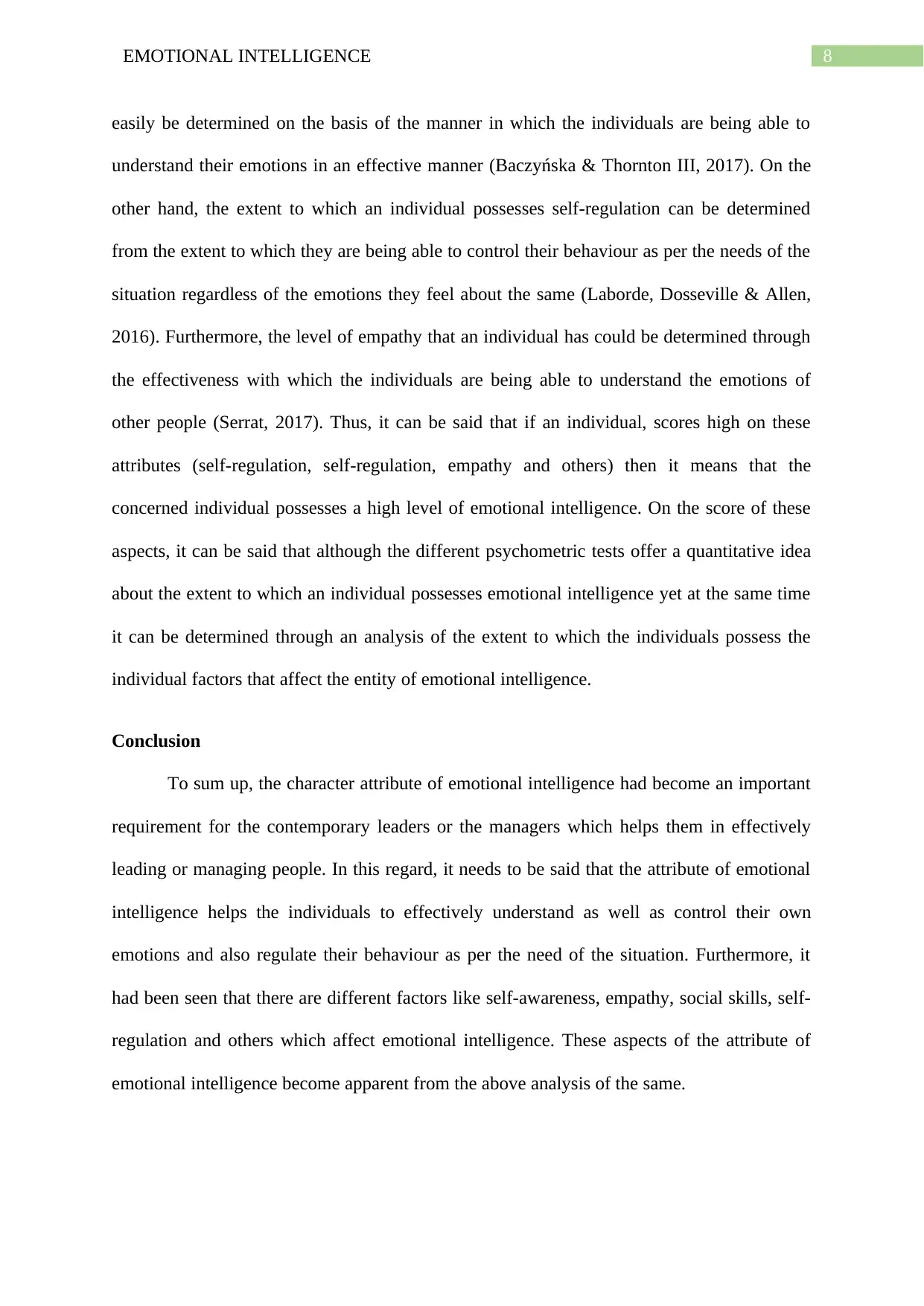
8EMOTIONAL INTELLIGENCE
easily be determined on the basis of the manner in which the individuals are being able to
understand their emotions in an effective manner (Baczyńska & Thornton III, 2017). On the
other hand, the extent to which an individual possesses self-regulation can be determined
from the extent to which they are being able to control their behaviour as per the needs of the
situation regardless of the emotions they feel about the same (Laborde, Dosseville & Allen,
2016). Furthermore, the level of empathy that an individual has could be determined through
the effectiveness with which the individuals are being able to understand the emotions of
other people (Serrat, 2017). Thus, it can be said that if an individual, scores high on these
attributes (self-regulation, self-regulation, empathy and others) then it means that the
concerned individual possesses a high level of emotional intelligence. On the score of these
aspects, it can be said that although the different psychometric tests offer a quantitative idea
about the extent to which an individual possesses emotional intelligence yet at the same time
it can be determined through an analysis of the extent to which the individuals possess the
individual factors that affect the entity of emotional intelligence.
Conclusion
To sum up, the character attribute of emotional intelligence had become an important
requirement for the contemporary leaders or the managers which helps them in effectively
leading or managing people. In this regard, it needs to be said that the attribute of emotional
intelligence helps the individuals to effectively understand as well as control their own
emotions and also regulate their behaviour as per the need of the situation. Furthermore, it
had been seen that there are different factors like self-awareness, empathy, social skills, self-
regulation and others which affect emotional intelligence. These aspects of the attribute of
emotional intelligence become apparent from the above analysis of the same.
easily be determined on the basis of the manner in which the individuals are being able to
understand their emotions in an effective manner (Baczyńska & Thornton III, 2017). On the
other hand, the extent to which an individual possesses self-regulation can be determined
from the extent to which they are being able to control their behaviour as per the needs of the
situation regardless of the emotions they feel about the same (Laborde, Dosseville & Allen,
2016). Furthermore, the level of empathy that an individual has could be determined through
the effectiveness with which the individuals are being able to understand the emotions of
other people (Serrat, 2017). Thus, it can be said that if an individual, scores high on these
attributes (self-regulation, self-regulation, empathy and others) then it means that the
concerned individual possesses a high level of emotional intelligence. On the score of these
aspects, it can be said that although the different psychometric tests offer a quantitative idea
about the extent to which an individual possesses emotional intelligence yet at the same time
it can be determined through an analysis of the extent to which the individuals possess the
individual factors that affect the entity of emotional intelligence.
Conclusion
To sum up, the character attribute of emotional intelligence had become an important
requirement for the contemporary leaders or the managers which helps them in effectively
leading or managing people. In this regard, it needs to be said that the attribute of emotional
intelligence helps the individuals to effectively understand as well as control their own
emotions and also regulate their behaviour as per the need of the situation. Furthermore, it
had been seen that there are different factors like self-awareness, empathy, social skills, self-
regulation and others which affect emotional intelligence. These aspects of the attribute of
emotional intelligence become apparent from the above analysis of the same.
⊘ This is a preview!⊘
Do you want full access?
Subscribe today to unlock all pages.

Trusted by 1+ million students worldwide

9EMOTIONAL INTELLIGENCE
Paraphrase This Document
Need a fresh take? Get an instant paraphrase of this document with our AI Paraphraser
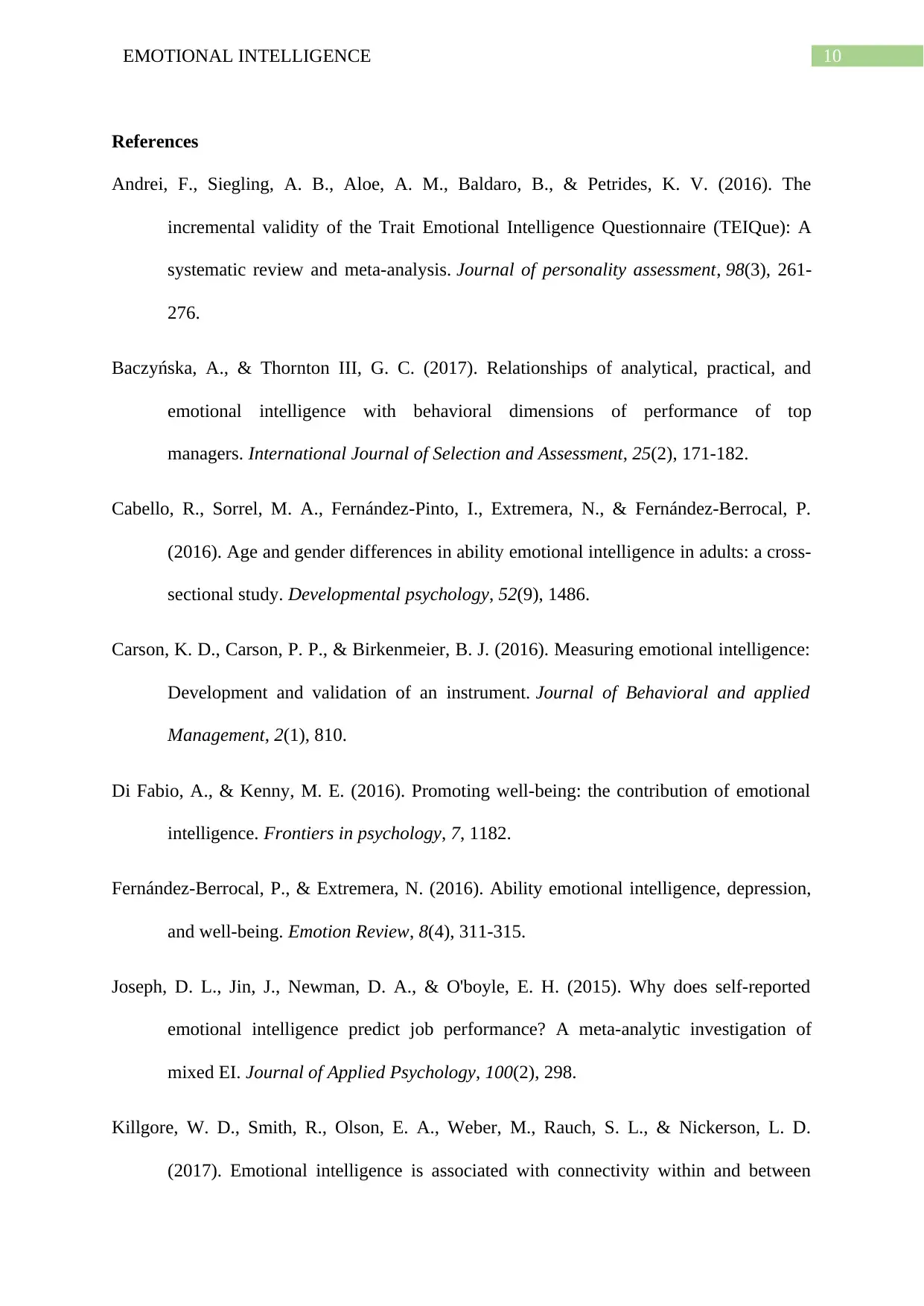
10EMOTIONAL INTELLIGENCE
References
Andrei, F., Siegling, A. B., Aloe, A. M., Baldaro, B., & Petrides, K. V. (2016). The
incremental validity of the Trait Emotional Intelligence Questionnaire (TEIQue): A
systematic review and meta-analysis. Journal of personality assessment, 98(3), 261-
276.
Baczyńska, A., & Thornton III, G. C. (2017). Relationships of analytical, practical, and
emotional intelligence with behavioral dimensions of performance of top
managers. International Journal of Selection and Assessment, 25(2), 171-182.
Cabello, R., Sorrel, M. A., Fernández-Pinto, I., Extremera, N., & Fernández-Berrocal, P.
(2016). Age and gender differences in ability emotional intelligence in adults: a cross-
sectional study. Developmental psychology, 52(9), 1486.
Carson, K. D., Carson, P. P., & Birkenmeier, B. J. (2016). Measuring emotional intelligence:
Development and validation of an instrument. Journal of Behavioral and applied
Management, 2(1), 810.
Di Fabio, A., & Kenny, M. E. (2016). Promoting well-being: the contribution of emotional
intelligence. Frontiers in psychology, 7, 1182.
Fernández-Berrocal, P., & Extremera, N. (2016). Ability emotional intelligence, depression,
and well-being. Emotion Review, 8(4), 311-315.
Joseph, D. L., Jin, J., Newman, D. A., & O'boyle, E. H. (2015). Why does self-reported
emotional intelligence predict job performance? A meta-analytic investigation of
mixed EI. Journal of Applied Psychology, 100(2), 298.
Killgore, W. D., Smith, R., Olson, E. A., Weber, M., Rauch, S. L., & Nickerson, L. D.
(2017). Emotional intelligence is associated with connectivity within and between
References
Andrei, F., Siegling, A. B., Aloe, A. M., Baldaro, B., & Petrides, K. V. (2016). The
incremental validity of the Trait Emotional Intelligence Questionnaire (TEIQue): A
systematic review and meta-analysis. Journal of personality assessment, 98(3), 261-
276.
Baczyńska, A., & Thornton III, G. C. (2017). Relationships of analytical, practical, and
emotional intelligence with behavioral dimensions of performance of top
managers. International Journal of Selection and Assessment, 25(2), 171-182.
Cabello, R., Sorrel, M. A., Fernández-Pinto, I., Extremera, N., & Fernández-Berrocal, P.
(2016). Age and gender differences in ability emotional intelligence in adults: a cross-
sectional study. Developmental psychology, 52(9), 1486.
Carson, K. D., Carson, P. P., & Birkenmeier, B. J. (2016). Measuring emotional intelligence:
Development and validation of an instrument. Journal of Behavioral and applied
Management, 2(1), 810.
Di Fabio, A., & Kenny, M. E. (2016). Promoting well-being: the contribution of emotional
intelligence. Frontiers in psychology, 7, 1182.
Fernández-Berrocal, P., & Extremera, N. (2016). Ability emotional intelligence, depression,
and well-being. Emotion Review, 8(4), 311-315.
Joseph, D. L., Jin, J., Newman, D. A., & O'boyle, E. H. (2015). Why does self-reported
emotional intelligence predict job performance? A meta-analytic investigation of
mixed EI. Journal of Applied Psychology, 100(2), 298.
Killgore, W. D., Smith, R., Olson, E. A., Weber, M., Rauch, S. L., & Nickerson, L. D.
(2017). Emotional intelligence is associated with connectivity within and between
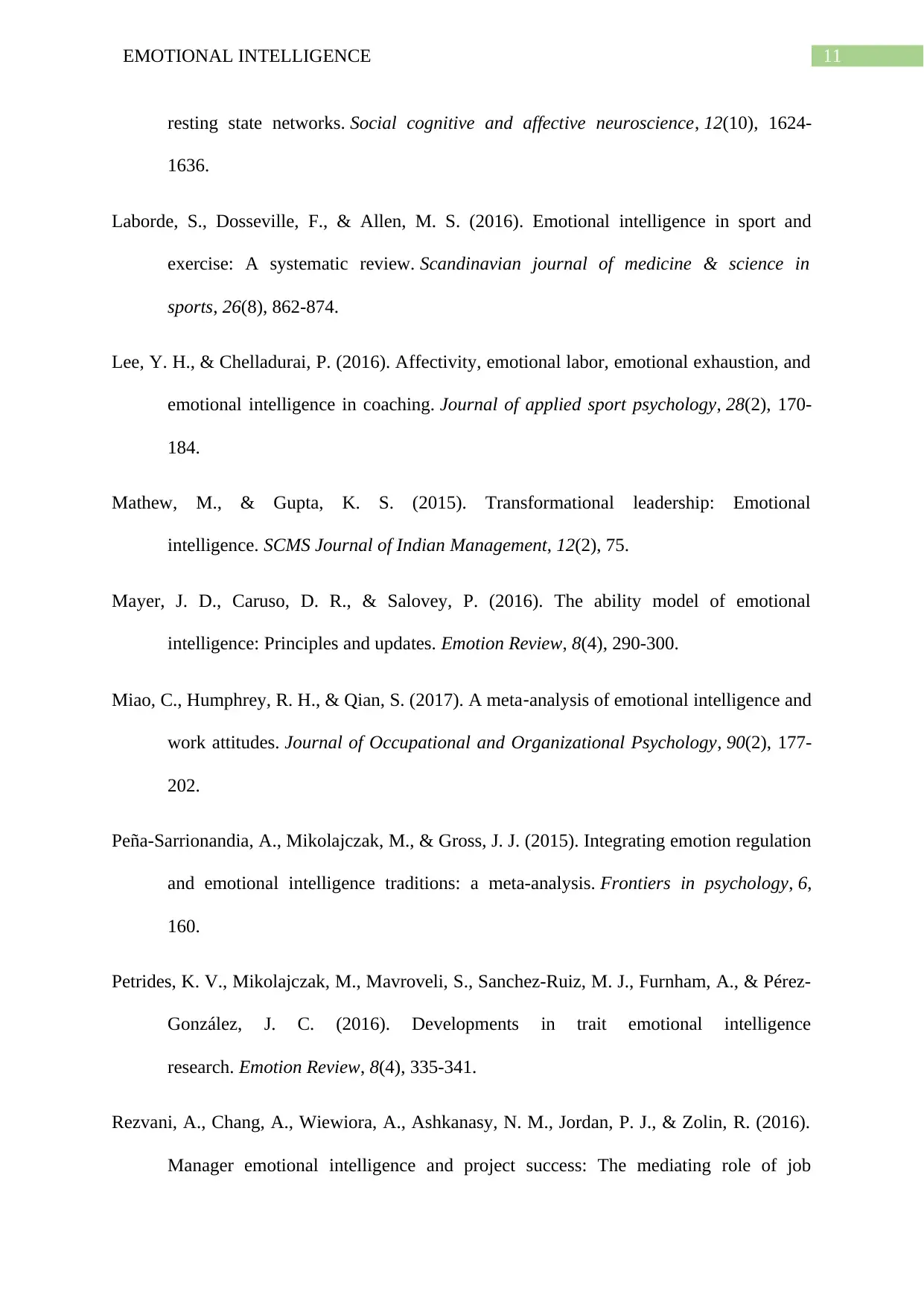
11EMOTIONAL INTELLIGENCE
resting state networks. Social cognitive and affective neuroscience, 12(10), 1624-
1636.
Laborde, S., Dosseville, F., & Allen, M. S. (2016). Emotional intelligence in sport and
exercise: A systematic review. Scandinavian journal of medicine & science in
sports, 26(8), 862-874.
Lee, Y. H., & Chelladurai, P. (2016). Affectivity, emotional labor, emotional exhaustion, and
emotional intelligence in coaching. Journal of applied sport psychology, 28(2), 170-
184.
Mathew, M., & Gupta, K. S. (2015). Transformational leadership: Emotional
intelligence. SCMS Journal of Indian Management, 12(2), 75.
Mayer, J. D., Caruso, D. R., & Salovey, P. (2016). The ability model of emotional
intelligence: Principles and updates. Emotion Review, 8(4), 290-300.
Miao, C., Humphrey, R. H., & Qian, S. (2017). A meta‐analysis of emotional intelligence and
work attitudes. Journal of Occupational and Organizational Psychology, 90(2), 177-
202.
Peña-Sarrionandia, A., Mikolajczak, M., & Gross, J. J. (2015). Integrating emotion regulation
and emotional intelligence traditions: a meta-analysis. Frontiers in psychology, 6,
160.
Petrides, K. V., Mikolajczak, M., Mavroveli, S., Sanchez-Ruiz, M. J., Furnham, A., & Pérez-
González, J. C. (2016). Developments in trait emotional intelligence
research. Emotion Review, 8(4), 335-341.
Rezvani, A., Chang, A., Wiewiora, A., Ashkanasy, N. M., Jordan, P. J., & Zolin, R. (2016).
Manager emotional intelligence and project success: The mediating role of job
resting state networks. Social cognitive and affective neuroscience, 12(10), 1624-
1636.
Laborde, S., Dosseville, F., & Allen, M. S. (2016). Emotional intelligence in sport and
exercise: A systematic review. Scandinavian journal of medicine & science in
sports, 26(8), 862-874.
Lee, Y. H., & Chelladurai, P. (2016). Affectivity, emotional labor, emotional exhaustion, and
emotional intelligence in coaching. Journal of applied sport psychology, 28(2), 170-
184.
Mathew, M., & Gupta, K. S. (2015). Transformational leadership: Emotional
intelligence. SCMS Journal of Indian Management, 12(2), 75.
Mayer, J. D., Caruso, D. R., & Salovey, P. (2016). The ability model of emotional
intelligence: Principles and updates. Emotion Review, 8(4), 290-300.
Miao, C., Humphrey, R. H., & Qian, S. (2017). A meta‐analysis of emotional intelligence and
work attitudes. Journal of Occupational and Organizational Psychology, 90(2), 177-
202.
Peña-Sarrionandia, A., Mikolajczak, M., & Gross, J. J. (2015). Integrating emotion regulation
and emotional intelligence traditions: a meta-analysis. Frontiers in psychology, 6,
160.
Petrides, K. V., Mikolajczak, M., Mavroveli, S., Sanchez-Ruiz, M. J., Furnham, A., & Pérez-
González, J. C. (2016). Developments in trait emotional intelligence
research. Emotion Review, 8(4), 335-341.
Rezvani, A., Chang, A., Wiewiora, A., Ashkanasy, N. M., Jordan, P. J., & Zolin, R. (2016).
Manager emotional intelligence and project success: The mediating role of job
⊘ This is a preview!⊘
Do you want full access?
Subscribe today to unlock all pages.

Trusted by 1+ million students worldwide
1 out of 13
Related Documents
Your All-in-One AI-Powered Toolkit for Academic Success.
+13062052269
info@desklib.com
Available 24*7 on WhatsApp / Email
![[object Object]](/_next/static/media/star-bottom.7253800d.svg)
Unlock your academic potential
Copyright © 2020–2026 A2Z Services. All Rights Reserved. Developed and managed by ZUCOL.




